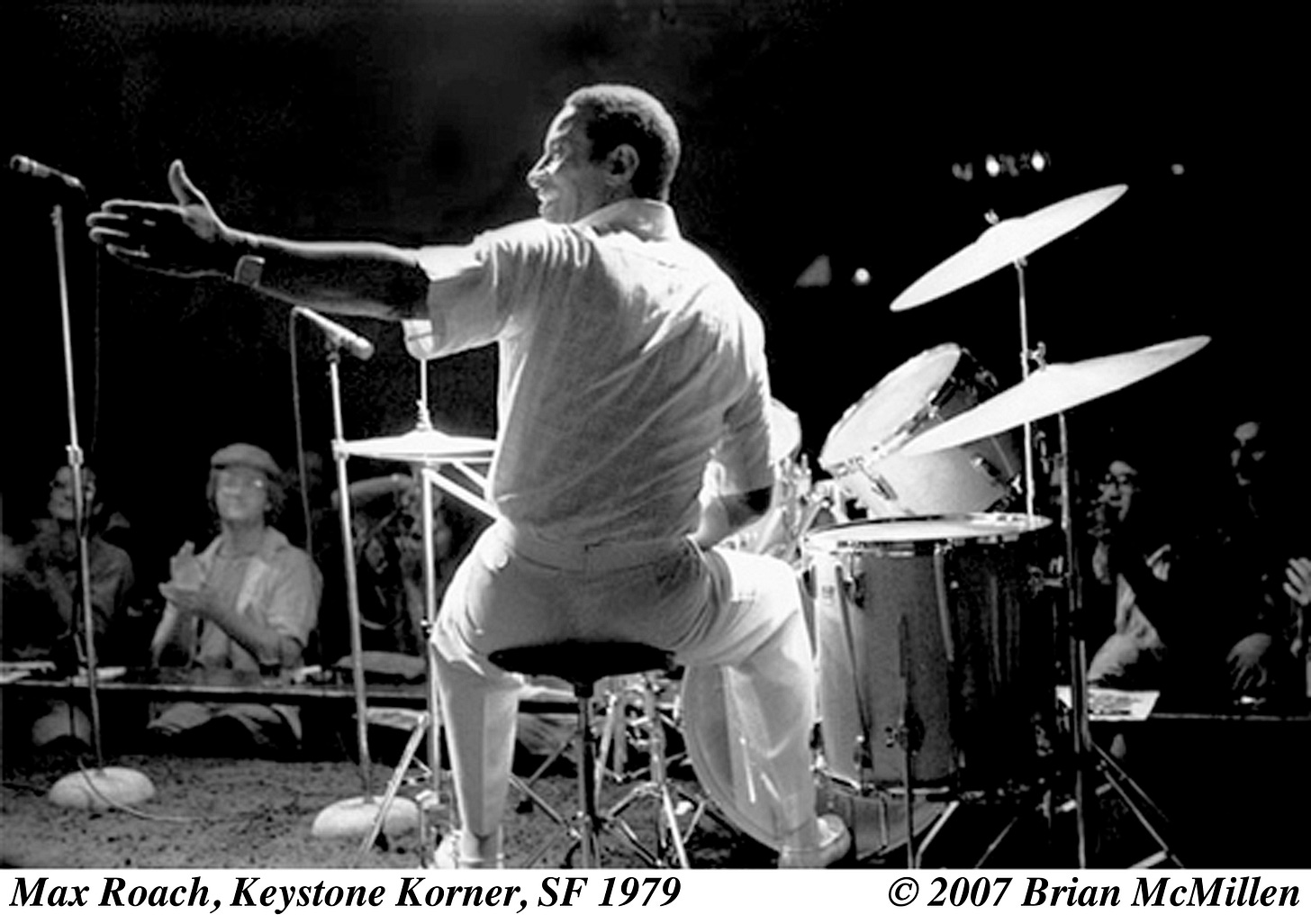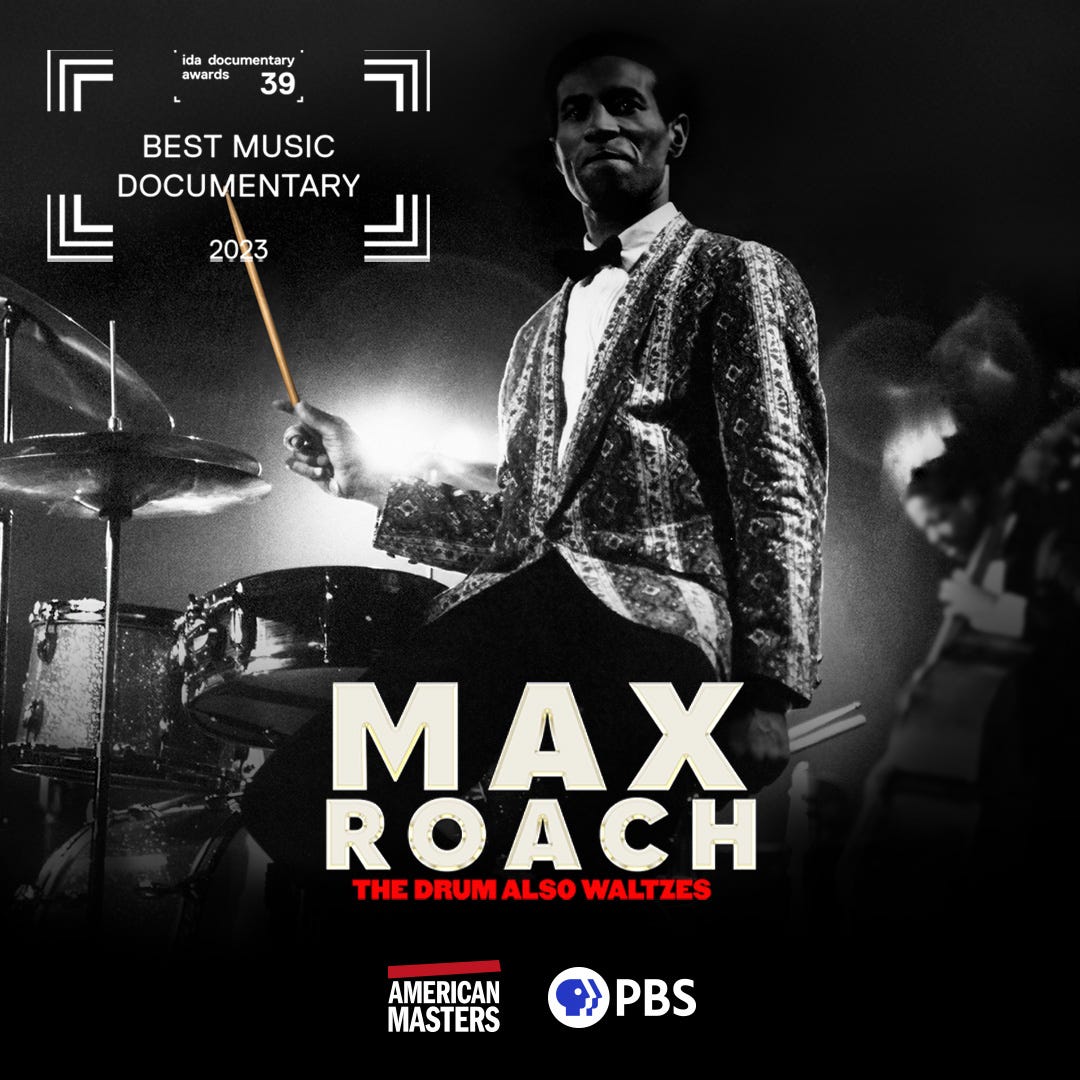Today, Wednesday, January 10th, 2024, is the 100th birthday anniversary of Max Roach.
It’s an occasion equally suited to solemn reflection on Roach’s life— the epitome of a life lived with purpose and integrity— or to getting out your Max Roach records, gathering some folks, and celebrating all the great music he left for us.
I’ve written some about Max before— here, here, and here— but this is a special occasion. I’m going to celebrate Max’s centennial with three posts:
A look at The Drum Also Waltzes, the documentary film about Roach;
A chronicle of the Coleman Hawkins recording sessions in 1944 featuring Dizzy Gillespie and Max Roach, often called the first bebop sessions;
A survey of Roach’s series of duo recordings, 1976-1982.
The basic approach to playing a drumset comes from Black Americans, starting in about 1890. In the late Nineteen Forties, Max Roach, a Black man and the leading young drummer in NYC, drawing on ideas from his peers and from older drummers, crystallized a conception that remains the basic template used by all jazz drummers today. Roach went on to great musical and social achievements, all derived from his brave innovations as a jazz drummer.
I’ve been staring at this screen for hours, searching for the words to properly acknowledge this achievement. Nothing seems adequate, so I’ll bring in Billy Hart:
“When I first saw Elvin Jones with Coltrane, before I could say anything to him he told me, ‘Look, don’t ask me to show you anything, because if I could show you, we would all be Max Roach.’
It’s like Max was born in the future.
He went ahead of everybody….
He was the spokesman for the whole drum community, and that means the whole drum community in the world.”
-Billy Hart to Ted Panken.
“The Drum Also Waltzes” is Max’s most iconic drumset composition, first released on Drums Unlimited (Atlantic, 1966). The motif of the solo is so simple and effective that it travels like a new slang term: when I first heard it in high school, I went directly to the drums and started playing my version of it. Every drummer knows it: Questlove plays it, Bill Bruford recorded a version of it, and John Bonham opened his solo on “Moby Dick” with “The Drum Also Waltzes” at the Royal Albert Hall in 1970.
The Drum Also Waltzes is also an award-winning 82-minute Max Roach documentary, released last March and streaming now on pbs.org. Directed by filmmakers Sam Pollard and Ben Shapiro, The Drum Also Waltzes is just great, a labor of love and respect.
It’s informative, sensitive, and celebratory, gracefully conveying the scope and importance of Max Roach while keeping him grounded in the real world. Anyone with an interest in music can enjoy this film, and come away knowing something about Max.
Above all, the film did what a music documentary should do: it made me go back and listen to Max Roach.
When the picture opens, it’s the mid-Eighties. First we meet the filmmakers, sensing their love for the subject, and then we meet Max Roach, at his home on Central Park West. Max sits down, starts talking about his life, and we’re off.
From here the film moves along a conventional timeline, tracking Roach’s life from childhood to his death in 2007. Eschewing a narrator and voice overs, Pollard and Shapiro put Roach and Roach’s community front and center, allowing them to tell the story.
We meet all five of Max’s children, including daughter Maxine Roach, violist and founding member of the Uptown String Quartet, sons Daryl and Raoul, and twin daughters Ayo and Dara. Later, we hear from poet Sonia Sanchez, unforgettable in her description of Max’s charisma and elegance; Roach’s godson Fab Five Freddy, embodying the hip-hop/jazz connection; and the sorely-missed musician and writer Greg Tate, quietly enthusiastic while providing helpful context.
The filmmakers leave the most room for Roach’s fellow musicians to speak: the stories and insights from Harry Belafonte, Dee Dee Bridgewater, Jimmy Heath, Albert “Tootie” Heath, Abdullah Ibrahim, Quincy Jones, Abbey Lincoln, Julian Priester, Warren Smith, Jeff “Tain” Watts, and Randy Weston are the heart of the film.
But it’s Mr. Sonny Rollins, powerfully candid and insightful, who I keep thinking about. Rollins is open and almost expansive as he talks about first hearing Charlie Parker and Max, describing Max the celebrity in the Black community, remembering the last time he and Max were together.
There is also an unforgettable moment of musical intimacy: Max Roach, in someone’s living room, perhaps his own, playing piano and singing “The Man of Double Deed”, an anonymous folk lyric. It’s a glimpse of the range of Max’s musicianship, and the depth of his emotions; this must be Max as those who knew him really knew him. We’re so lucky to have this scene.
Elsewhere, Roach’s personal struggles— his battles with addiction, his rage, paranoia, and depression— are admirably addressed head-on, by both his family and his colleagues. As Ms. Dee Dee Bridgewater summarizes:
“These men came along at a time when it was rough. And it was really rough for the Black man.”
All respect.
Of course, squeezing a life into an 82-minute documentary means that important events are omitted. I was hoping for a discussion of Roach’s work with Booker Little, or maybe some shots of his duets with Cecil Taylor, but no dice. I was thrilled, however, to see M’Boom featured prominently, with stories from Warren Smith and great shots of them rehearsing and performing. And I’m sure we would have all loved more raw footage of Roach playing the drums, but we can just go to YouTube for that.
These tiny quibbles aren’t enough to dampen by enthusiasm for the film. Clearly, Pollard and Shapiro assume those watching The Drum Also Waltzes are already familiar with Max’s music, a generous and respectful assumption. By allowing Max and his people to tell their own story, and letting the music speak for itself, they’ve made a Max Roach film worthy of the subject, a feat to be celebrated.
Bravo, Sam Pollard and Ben Shapiro! We’re very fortunate to have this film, but we’re even more fortunate to have had Max Roach.
TUNE IN TOMORROW for a listen to the Coleman Hawkins sessions of 1944 featuring the original “Woody ‘N’ You”, with a 20-year old Max Roach on drums and a quick walk through the Max Roach and Charlie Parker collaborations.




it is no longer streaming now on pbs.org. - not sure how one watches this, but i would like to! thanks vinnie..
Excellent documentary, Vinnie, and you're right –– I did pull out my Max Roach albums!! Look forward to tomorrow's post!